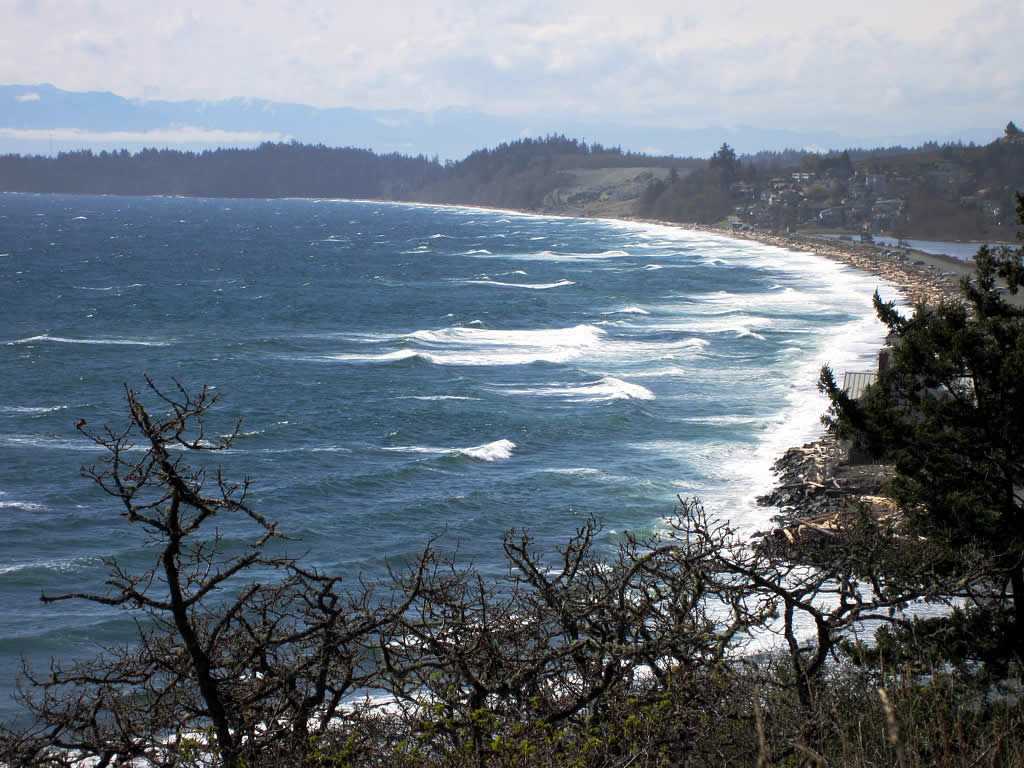Democracy in action – Esquimalt
“Democracy in action” captured the scene this week at a lively all-candidates meeting in Esquimalt. It was standing room only as 14 candidates vied for the votes of more than 200 local residents.
Co-sponsored by Esquimalt United Church and Dogwood Initiative, the session focused on ecological concerns: oil tankers off our coast, renewable energy, sewage treatment solutions, and food security.
Candidates had three minutes to present their views, followed by an hour of pointed questions from the audience. Church minister Leanne Benoit kept the peace as a firm but fair moderator.
Throughout the evening citizens made the case for local decision-making power over air, land and water. Candidates echoed those values and promised to carry them into office. It was an encouraging reflection of Dogwood’s mountain-top goal.
Eight of the 14 candidates were outspoken in their opposition to expanded oil tanker traffic off our coast.
“We made the province and CRD listen to our views about sewage treatment and we can do the same about oil tankers,” declared incumbent councillor Tim Morrison. “We need public control over our land and water and meaningful consultation.”
“Under my leadership, the environment is now a core value by which all Council decisions are evaluated,” said Barbara Desjardins, Esquimalt’s incumbent mayor. “We passed a motion in 2012 calling for a permanent ban on more oil tankers […] it’s our air, water, land and health that’s at stake!”
Council candidate Beth Burton-Krahn applauded the District of Sooke’s initiative in putting expanded oil tanker traffic on the ballot this November. Olga Liberchuk reminded the audience that “climate change has no borders.” Meagan Brame insisted “there’s no way to mitigate an oil spill.”
Sewage treatment was also a hot topic, with nearly all candidates supporting a decentralized regional model with tertiary treatment.
Some audience members expressed concern that mayoral challenger John Ducker might yield to CRD pressure and reverse the Council’s firm stand against a 1960s-style centralized sewage treatment plant at McLoughlin Point. Ducker defended his lack of familiarity with the issue by explaining that he was out of the country for much of the preceding year, but promised to prioritize “value for taxpayers” in any sewage solution.
Dogwood supporters asked mayoral candidates what they’d do to stop Kinder Morgan’s proposal. “More municipal lobbying at both the provincial and federal level” said Desjardins and Ducker. Candidate Susan Low also suggested we partner with First Nations and support their legal challenges.
Solar initiatives, bike lanes, electric vehicles, composting in apartment buildings, preserving agricultural land, higher density, and community gardens rounded out the list of resident concerns.
As people entered and left the meeting, Dogwood volunteers handed out our new candidate survey handbill, which was well received. Voters anywhere in B.C. can see responses from their local candidates on Dogwood’s municipal website: http://LocalVote2014.ca
Now we have two weeks left to encourage friends and family members to vote.
In 2011 only 2,300 Esquimalt residents voted in the municipal election: a paltry 18 per cent. Dogwood now has more than 2,800 Let BC Vote pledgers signed up in Esquimalt, so let’s be sure to leave 18 per cent turnout in the dustbin of history!

